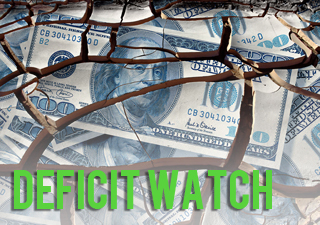Media

Pennsylvania Deficit Watch: June 2017
For the first time in seven months, the commonwealth’s revenue collections exceeded expectations. Pennsylvania collected $2.6 billion in May—$98.5 million more than anticipated. Still, total collections remain approximately $1.1 billion, or 3.8 percent, below estimate.
Pennsylvania’s three largest sources of revenue—income, sales, and corporate taxes—remain well below official estimates, pointing to a lingering weakness in the economy. The state’s unemployment rate is 4.9 percent, which ranks 39th in the country and more than half a percentage point above the national average of 4.3 percent.
The economy’s meager performance is partly the product of the state’s poor fiscal position. Decades of imprudent spending decisions have led to both real and projected deficits as well as an onerous tax burden, which has stymied robust economic growth. Add a burdensome regulatory climate to this mix, and it’s a recipe for permanent stagnation.
Luckily, Pennsylvania is the sum of its choices and can therefore shape its own destiny. House lawmakers have already opted to change course by passing a budget that moves the state in a more fiscally responsible direction. Their budget reduces corporate welfare, keeps spending in line with the Taxpayer Protection Act index, and does not raise taxes.
Not to be outdone, the Senate gave taxpayers another reason to be optimistic. The chamber moved pension reform out of the Appropriations Committee last night, and the full Senate advanced the legislation to the House this afternoon. The bill would represent the largest shift in taxpayer risk of any reform plan in the country.
Plenty of work is left to be done, but both the pension plan and House budget should give Pennsylvanians reason to hope for even more transformative reforms going forward. Why? Because we’re in the process of witnessing a culture shift in the legislature and in Pennsylvania.
Big government special interests are losing their power, and as a result, lawmakers are moving legislation that places an emphasis on the needs of taxpayers. If this shift continues, expect Pennsylvania to become a destination state for families in pursuit of a better life.